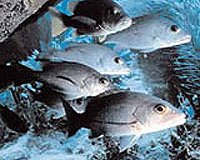 |
Buenos Aires (UPI) May 14, 2010 Mercosur countries are inching toward winning European Union agreement to talk about an association agreement that runs counter to the wishes of Europe's heavily subsidized farmers. After protracted lobbying by member countries of the Latin American trade bloc -- Argentina, Brazil, Paraguay and Uruguay -- the EU announced it would reopen talks that have remained suspended since 2004. European fears of the market being flooded with cheaper Latin American produce contributed to the deadlock, but the intervening years have given Mercosur nations financial clout and greater negotiating powers. Last week industry sources indicated that inconclusive talks on a lucrative French arms deal with Brazil could be influenced if there was no progress toward Mercosur trade talks. About 10 EU countries are still opposed to giving any trade concessions to Mercosur. European Commission President Jose Manuel Barroso argued a deal could benefit both sides, not just the Latin Americans. By deciding to resume talks, he said, "the EU is seizing an important opportunity. "As we look to strengthen the global economy after the downturn, a successful outcome can offer real benefits in terms of jobs and growth for both sides. But we are starting a negotiation here, and we can only conclude if we get it right," he warned. Analysts said the announcement of a resumption of talks was no guarantee negotiations could get anywhere anytime soon. ??European Commissioner for Trade Karel De Gucht said the talks could be "challenging but the moment is right to take a fresh look." In an apparent nod to the farmers' lobbies, he said the EU hopes agreement would give EU greater access to Latin America's growing markets for all businesses -- including agriculture. "Mercosur is a large market with great growth potential and an increasingly important partner for the EU," he said. "Any future free-trade agreement, the first such trade deal for Mercosur, would give EU exporters, investors and services providers better access to this market than ever before and is therefore likely to bring substantial economic benefits." For the EU, he said, the economic benefit could be an increase of around $5.6 billion of exports per year. Mercosur is expected to benefit from a similar increase of exports to the EU.?? The EU will strive for full liberalization for a very large part of trade in goods and concessions for all major industrial sectors, De Gucht said. It will also aim at major liberalization of service sectors. Other EU demands will relate to public procurement, intellectual property, geographical indications and provisions on sustainable development, he added. The EU and Mercosur began talks about free trade as far back as 1995 but the negotiations broke down without accord in 2004. European governments have been wary of upsetting farmer lobbies or losing EU agricultural subsidies. The lure of Latin America, however, is overpowering, all the more so as EU faces renewed pressures amid the Greek crisis, its impact on the euro and overall ramifications of an ongoing financial difficulty that is far from dispelled. EU views Mercosur, with Venezuela likely to be included soon, as a lucrative market with a gross domestic product in excess of $1,600 billion. With growth rate projections for most Latin American countries still optimistic, EU exporters see Mercosur on par with India and ahead of both Canada and Korea. Over the past four years until the downturn, EU exports to Mercosur increased by more than 15 percent annually. EU investments in Mercosur exceed $200 billion -- more than EU investments in China, India and Russia together. Pro-Mercosur Europeans also want a deal because, so far, the trading bloc has not concluded any free trade agreements with any major competitor. However, anti-Mercosur lobbyists see political problems ahead for most EU governments that receive EU subsidies. Last week, the French National Association of Agricultural Workers' Unions petitioned President Nicolas Sarkozy to stop Spain, the current EU president, from pursuing Mercosur talks. "The cost for European agriculture would be too high," the association said. The association claims European beef farmers could lose more than $5 billion if a deal went through. On the sidelines of the Mercosur debate, Argentina was lobbied by European Union envoys in Buenos Aires who turned up at the Congress to protest food import restrictions. The Argentine import restrictions follow similar curbs introduced earlier by Brazil.
Share This Article With Planet Earth
Related Links Farming Today - Suppliers and Technology
 Major US fishery takes a beating after oil spill
Major US fishery takes a beating after oil spillNew Orleans (AFP) May 13, 2010 One of the biggest victims of the huge oil spill slamming Louisiana's economy is the region's largest fishery, which has seen its catch drop 50 percent at a critical time in the season. Three weeks into the six-month fishing season, the Gulf of Mexico oil slick has made a "just dreadful" impact on the industry, said Daybrook Fisheries president Gregory Holt. He described his business as the ... read more |
|
| The content herein, unless otherwise known to be public domain, are Copyright 1995-2010 - SpaceDaily. AFP and UPI Wire Stories are copyright Agence France-Presse and United Press International. ESA Portal Reports are copyright European Space Agency. All NASA sourced material is public domain. Additional copyrights may apply in whole or part to other bona fide parties. Advertising does not imply endorsement,agreement or approval of any opinions, statements or information provided by SpaceDaily on any Web page published or hosted by SpaceDaily. Privacy Statement |